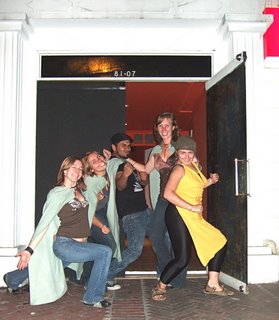In a new twist, "
Rebels ask celebs to assist prisoner swap"
BOGOTA, COLOMBIA — Colombia's largest rebel group is calling on actor Denzel Washington and directors Oliver Stone and Michael Moore to help it reach a deal with the government on exchanging imprisoned guerrillas for rebel-held hostages, including three U.S. defense contractors.
Colombia will only be home to me for another 25 days. 25 days. Nothing, really. What a strange thing, this life. There's so much I'll miss of life here, but so much I miss from my life too. I'm almost ready to go home, but will I be ready to be home once I'm there? This train of thought is making me feel like Carrie...falls under the category of thoughts that may have profound implications for my own life, but aren't actually profound and probably should be handled internally. Blogs are ruining the world. People don't keep anything in anymore -- everything is public, shared, and less forceful because a dozen earlier memoirs said exactly the same thing. Restraint: an un
derappreciated emotional tool. Anyway. Back to me.
Colombia is both a really tough and incredibly easy place to dive into headfirst and grow to love, despite itself. Last night at Son Salome, an excellent sa
lsoteca, a professorial type I was dancing with asked me how I felt about Colombia. I answered without
hesitation that I loved it. What that means really I'm not sure, but the response surprised him. Why? Why in the world? he asked, dumbfounded. I don't know, I replied. It's the
ánimo (a word I have a hard time translating) -- I love Colombia despite its Col
ombianess. ánimo
1 (talante) spirit
2 (estímulo, fuerza) courage
3 (intención) intention
So there you have it. Today we had a second salsa lesson with an instructor recommended by our friendly star-reader. Tom and Porter basically had a private lesson; Eli and I got one too. It's hard to lead! I have more sympathy for men when they try to learn to dance after today. As the female half of the dance team (which makes it sounds like sequins were involved, but there weren't thank god), you are responsible for "following." It sounds sexist, but in some ways it's a relief. I wouldn't characterize Slim and I this way, but in past relationships I've had to do way more of the leading than I would have liked. It's tiring! So dancing can be a good way to let go of that for a while, and just follow along. It's a bit like the difference between writing a story and reading one aloud. Both are challenging, but the reader can relax into their own private world to some extent and not worry about the next move.
Me being me, I have a half dozen unfinished projects calling me before I leave. Not least among them a final presentation (Fulbright really asks so little of us, it seems petty to complain, but that probably won't stop me from doing it), a paper, a website, a grant to seek, a proposal to translate, a computer to locate, and so so many nasty phone calls. Nasty not because of the people on the other end of the line but because I hate making phone calls! Another thing Colombia has challenged me, well, taunted me with: my many limitations are even more limiting in Spanish. Gives me a whole new appreciation for immigrants, especially those who struggle with our messed up, irregular language.
Spanish, in contrast, is nice and neat. And it still kicks my ass many days of the week. I'm actually pretty competent most of the time, then something will happen like I'll make a phone call, introduce myself, then listen with dismay as the person on the other end of the line exclaims, "I can't understand anything you're saying!" And I will merely have stated my name. Now that's a humbling experience when it happens once. Try to imagine it happening once a week. What can I say, R's are tough for me. Mom, Dad, there are so many perfectly nice names that stay far far away from Rs...why couldn't I have one of those? If I ever live in Latin America again I'm changing my name, to Ana, or Diana, anything two syllables or less and easily recognizable when it leaves my twisted tongue.
In two weeks we're headed back to Medellin. I realize I still haven't completed the saga that was our trip to Uraba,
and the "community" -- right now I'm just hoping the bus ride to Medellin will involve lesser quanti
es of dramam
ine. Speaking of which, I sure do wish there were some kind of dramamine that could prevent the motion sickness that accompanies culture shock. Atlanta, Bogota, Atlanta, Bogota, Atlanta. It's been a year full of adjustments, and there's one big one left to make. You know what, though? I'm ready. I realized this year how much I need to be around my big, loud, stressful family.
What I'm listening to: Never needed anybody, I never needed anybody // I never needed anybody, I never needed nobody // Don't worry about it, honey // I never needed anybody // I never needed anybody, it won't change now.
And you know what? It's just not true.
But in 25 days, I'll be able to go back to pretending it is. And that I'm looking forward to. Big, independent me. Inside though, I'll know. I'm more connected to my people than I ever realized; before I stretched those links across a continent, and they held.


































